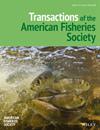Climate winners: Adapting to shifting species in the New England supply chain
IF 1.4
3区 农林科学
Q2 FISHERIES
引用次数: 0
Abstract
ObjectiveClimate change is driving shifts in marine species' distributions, affecting resource availability for fishery supply chains worldwide. While research and governance have been in step with fishing impacts, consequences to the downstream supply chain are not generally considered. In this project, we identify how and to what extent New England seafood supply chains are capable of navigating anticipated shifts in species distributions. The study was especially concerned with the degree to which suppliers would consider incorporating "climate winners": species that are predicted to become more abundant in New England waters.MethodsUsing indicators derived from climate resilience and adaptive fisheries frameworks, we characterized supply chain adaptability for 27 seafood businesses across New England.ResultThe results revealed a range of adaptability linked to particular supplier characteristics, including diversity of services, processing infrastructure, and market diversity. External factors such as consumer preference, regulatory policy, and employment in the industry also indicated climate vulnerabilities. Despite these limiting factors, however, most businesses appeared to be not only capable but also willing to incorporate climate winner species into their portfolio.ConclusionOur conclusions support the idea that New England seafood suppliers adopt different strategies for climate resilience based on their business model, with considerable potential to take advantage of species shifts given the right incentives. To reduce vulnerabilities in the face of unprecedented change, it is critical that managing practitioners and partnering organizations encourage portfolio diversification with market incentives and adaptive management measures.气候赢家:适应新英格兰供应链中物种的变化
目标气候变化正在推动海洋物种分布的变化,影响全球渔业供应链的资源可用性。虽然研究和治理工作与渔业影响同步进行,但对下游供应链的影响却未得到普遍考虑。在本项目中,我们确定了新英格兰海产品供应链如何以及在多大程度上能够驾驭物种分布的预期变化。这项研究尤其关注供应商在多大程度上会考虑纳入 "气候赢家":即那些预计在新英格兰水域会变得更加丰富的物种。方法利用从气候适应性和适应性渔业框架中得出的指标,我们描述了新英格兰地区 27 家海产品企业供应链的适应性。消费者偏好、监管政策和行业就业等外部因素也显示了气候的脆弱性。尽管存在这些限制因素,但大多数企业似乎不仅有能力,而且也愿意将气候赢家物种纳入其产品组合。为了在前所未有的变化面前降低脆弱性,管理从业者和合作组织必须通过市场激励和适应性管理措施鼓励投资组合多样化。
本文章由计算机程序翻译,如有差异,请以英文原文为准。
求助全文
约1分钟内获得全文
求助全文
来源期刊
CiteScore
2.90
自引率
7.10%
发文量
48
审稿时长
8-16 weeks
期刊介绍:
Transactions of the American Fisheries Society is a highly regarded international journal of fisheries science that has been published continuously since 1872. It features results of basic and applied research in genetics, physiology, biology, ecology, population dynamics, economics, health, culture, and other topics germane to marine and freshwater finfish and shellfish and their respective fisheries and environments.

 求助内容:
求助内容: 应助结果提醒方式:
应助结果提醒方式:


